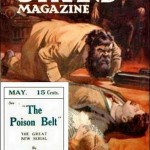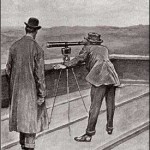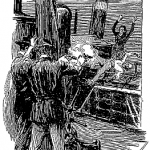“Look here, boss,” said a rough-looking fellow in the front of the crowd, “you keep your hair on, and don’t get slinging words about too freely, or it may be the worse for you and for your office too. We heard as there was big news, an’ we come down to hear it, but as to gettin’ it without paying, that ain’t our sort. I suppose we can call it square if we each hands in sixpence, which is the price o’ your paper, and then you can tell us what’s on.”
O’Flaherty considered for a moment. “It’s worth a shillin’ each,” he said, “for it plays the divil with the circulation of a paper whin its news gits out too soon.”
“Well, we won’t stick at that,” said the miner. “What say you, boys?”
There was a murmur of assent, and a broad-brimmed straw hat was passed rapidly from hand to band. It was half full of silver when it reached O’Flaherty. The Advertiser had never before had such a circulation, for the crowd had rapidly increased during the preceding dialogue, and now numbered some hundreds.
“Thank ye, gintlemen,” said the editor.
“Well, what’s the news?” cried the impatient crowd.
“Sure I haven’t opened the bag yet, but I soon will. Whativer it is it’s bound to be there. Hey there, Billy, ye divil’s brat, where’s the mail bag?”
Thus apostrophized, a sharp little Kaffir came running out with the brown bag, and Mr. O’Flaherty examined it in a leisurely manner, which elicited many an oath from the eager crowd.
“Here’s the Standard and the Times,” he said, handing the various papers out to his subordinate. “Begad, there’s not one of ye knows the expinse of k’aping a great paper loike this going, forebye the brains and no profit at the ind of it. Here’s the Post and the News. If you were men you’d put in an advertisement ivery wake, whether ye needed it or not, just to encourage literature. Here’s the Cape Argus—it’ll be in here whativer it is.”
With great deliberation Mr. Hector O’Flaherty put on a pair of spectacles and folded the paper carefully round, so as to bring the principal page to the front. Then he cleared his throat, with the pomposity which is inseparable with most men from the act of reading aloud.
“Go it, boss!” cried his audience encouragingly.
“‘Small-pox at Wellington’—that’s not it, is it? ‘Germany and the
Vatican’—’Custom House Duties at Port Elizabeth’—’Roosian Advances in
Cintral Asia’ eh? Is that it—’Discovery of great Diamond Moines?'”
“That’s it,” roared the crowd; “let’s hear about that.” There was an anxious ring in their voices, and their faces were grave and serious as they looked up at the reader upon the steps of the office.
“‘Diamond moines have been discovered in Roosia,'” read O’Flaherty, “‘which are confidently stated to exceed in riches anything which has existed before. It is ginerally anticipated that this discovery, if confirmed, will have a most prejudicial effect upon the African trade.’ That’s an extract from the London news of the Argus.”
A buzz of ejaculations and comments arose from the crowd. “Isn’t there any more about it?” they cried.
“Here’s a later paper, boss,” said the little Kaffir, who had been diligently looking over the dates.
O’Flaherty opened it, and gave a whistle of astonishment. “Here’s enough to satisfy you,” he said. “It’s in big toipe and takes up noigh the whole of the first page. I can only read ye the headings, for we must get to work and have out a special edition. You’ll git details there, an’ it’ll be out in a few hours. Look here at the fuss they’ve made about it.” The editor turned the paper as he spoke, and exhibited a series of large black headings in this style:—
RUSSIAN DIAMOND FIELDS.
EXTRAORDINARY DISCOVERY BY AN ENGLISHMAN. THREATENED EXTINCTION OF THE CAPE INDUSTRY. GREAT FALL IN PRICES. OPINIONS OF THE LONDON PRESS. FULL DETAILS.
“What d’ye think of that?” cried O’Flaherty, triumphantly, as if he had had some hand in the matter. “Now I must git off to me work, and you’ll have it all before long in your hands. Ye should bliss your stars that ye have some one among ye to offer ye the convanience of the latest news. Good noight to ye all,” and he trotted back into his office with his hat and its silver contents in his hand.
The crowd broke up into a score of gesticulating chattering groups, and wandered up or down the street. Ezra Girdlestone waited until they had cleared away, and then stepped into the office of the Advertiser.
“What’s the matter now?” asked O’Flaherty, angrily. He was a man who lived in a state of chronic irritation.
“Have you a duplicate of that paper?”
“Suppose I have?”
“What will you sell it for?”




